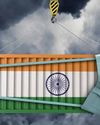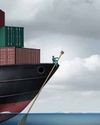DP World is looking to alter the way business is done in the world’s biggest landlocked country. Kazakhstan quite literally is at the crossroads of the New Silk Route connecting the East and West. A port, a logistics hub and a SEZ at Kazakhstan developed by DP World will make it the most significant trade corridors connecting Asia, Europe and Africa. It will be Advantage India too.

This is a story that has been in the works for almost six years now when the Kazakh Premier first approached the governments in the UAE to help strengthen the trade and logistics infrastructure of the country. Developing and strengthening road and rail networks would transform Kazakhstan into an economic power house as it shortens movement of goods between the East and West by almost a month.
“A voyage that would take 42 days or more by sea would probably take just 13 days by road and rail via Kazakhstan,” said Anil Singh, former CEO & MD (Sub Continent Region), DP World. When this was established as a fact both the Kazakh government that commissioned marine and inland development and DP World that was executing it swung into action swiftly. Pacts were signed and cement, steel and equipment started moving to Aktau and Khorgos- the two border cities across the country marked for port and SEZ development.
For starters, Khorgos is on the China side of the Kazakh border and Aktau is located on the east bank of the Caspian Sea on the western side of the border. Estimates suggest that some $8 billion worth of cargo passes through this region every year. So the Silk Road, formerly known as One Belt One Road, is an ambitious plan to build a network of highways, railways and pipelines linking Asia via the Middle East to Europe and south through Africa. The economic land or “belt” takes cargo, in large part via Khorgos, through Eurasia. One the other hand, the maritime “road” links East and West via a series of ports to Africa and the Mediterranean.
Bu hikaye Maritime Gateway dergisinin January 2018 sayısından alınmıştır.
Start your 7-day Magzter GOLD free trial to access thousands of curated premium stories, and 9,000+ magazines and newspapers.
Already a subscriber ? Giriş Yap
Bu hikaye Maritime Gateway dergisinin January 2018 sayısından alınmıştır.
Start your 7-day Magzter GOLD free trial to access thousands of curated premium stories, and 9,000+ magazines and newspapers.
Already a subscriber? Giriş Yap

Impact Of Covid-19 On Shipping And Logistics
Industry stalwarts discuss threadbare the prevailing logistics and supply chain scenario and issues in clearing cargo during the COVID-19 lockdown

Digital Platforms Defy Lockdown
Digital trading modules such as eNAM are enabling farmers to move their produce from farm to market even during the lockdown

GARMENT TRADE TRAMPLED
As retailers face a shutdown in US and Europe, the cascading affect has caused mass cancellation of orders in Bangladesh

TRADE RESUMES WITH CHINA
While India has allowed uninterrupted movement of imports into Nepal even during lockdown, China is reopening its borders as it emerges from the pandemic
LESS HUMAN INTENSIVE, MORE DATA DRIVEN
AI provides transformational opportunity for logistics industry by improving customer experience, operational efficiency, faster turnaround time and lower cost while ensuring security and transparency. Macro environment requires industry to transform to be less human intensive, agile and data driven, all of which can be accelerated by AI adoption, shares Gangadhar Gude, Founder & CEO, atai.ai

SHAKEN AND STIRRED
The COVID-19 pandemic has partially paralysed the logistics and supply chain, but the industry is still deterred to ensure supply of essentials continues

TRADE STUCK, ECONOMY SLOWS DOWN
Sri Lankan economy slows down as trade deficit widens and supply chain disrupts amidst lockdown

LENDING INTELLIGENCE TO SUPPLY CHAIN
If you’re shipping millions of dollars’ worth of pharmaceuticals, high-end electronics, expensive seafood, or precious metals, what would you be willing to pay for the ability to ‘ask’ your shipment where it is right now and whether it’s ok? What would you pay for a freight smart enough to raise an alarm before it spoils? Artificial Intelligence enables that and much more…

CONTAINER LINES SIGNAL ‘SOS'
As the per-unit cost of operations increases many lines are forced to blank sailings which has hit their bottom line real hard. The Government and Terminal Operators therefore need to actively consider reduction in Vessel Related Costs

IMO 2020 And The Covid-19 Curse
The COVID-19 outbreak has shaken and stirred the already volatile bunker market. While the refiners adjust their capacities and shipping lines choose their path to compliance, the market dynamics are yet to reach an equilibrium